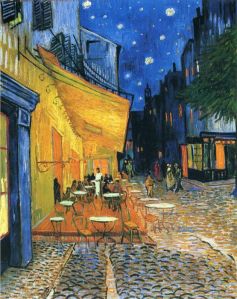Jamira is maybe in her thirties, I don’t know. She’s mentioned ‘my babies’ a few times, so I know her at least to be a mother. But ‘black don’t crack’ as the saying goes, so, with her flawless mocha skin, her age is of mystery to me. I like her youthfulness, though—the other tillers at the Chevron are stubbornly white-haired and have white-hair proclivities. John—who I like—has his homespun aphorisms, my favorite being:
Me: How are you this fine day, John?
John: (halfway drawling) Well, been shot at and missed, been shit at and hit.
Both afford me free coffee on the regular seeing as I go to the Chevron near daily for my Brazilian medium-roast, every other day for my smokes. I’ve put Jamira to the test: upon entering the store and announcing that it is, indeed, a ‘good morning’, I ask her, “So what am I getting?”
Jamira likes this game, though she gets it wrong every time. “Wait, wait—don’t tell me!” and she scans the cigarette display for my brand, which is bottom shelf and to the left. Every single time she hovers over the Cowboy Killers, which are top shelf, before invariably settling on the silver Marlboro lights: “These ones!” I shake my head. “C’mon, Jamira—I told you it’s the ones Kurt Cobain smoked.” (I found out this factoid in one of my internet searches of Kurt—we share the same DSM-V diagnosis and brand of cigarettes apparently).
“Ah—here you go!” and she plucks the Newport 100s from their place on the display. (I learned to smoke 100s at Casa Palmera because with only five cigarette breaks a day, one cigarette per session, you needed a longer smoke. Never have I seen people so eager to hit off re-frys as I did at Casa. Take away substance, addicts need SOMEthing and cigarettes do the trick).
“That’s the one, Jamira” and she smiles pretty. She’s got the best white-toothed grin this side of Cheshire, and lashes that are almost unnaturally long (they’re real, though). Jamira always wears a head wrap so I haven’t seen her hair, still I know it to be short. Her wrap resembles a Sikh turban—maybe it is, our conversations haven’t wandered into theological territory yet—with a large knot in front.
“Someday, I’ll getchoo,” she says, and I trust she will. An impulse comes over me.
“Jamira, I’m going to hazard a guess here,” I say as I pass her my monies, and she raises an eyebrow while still punching keys.
“Mmmmhmm..”
“You’re a singer aren’t you?” She looks up and Cheshire grins again.
It’s a writer’s intuition. ‘The human-sense antennae’ David Foster Wallace called it, as if we were an army of intelligible ants with probing feelers a-twitch, sussing out the people-scape with the energy of a thousand solar cells. Twitch twitch. Mary Wells face. Twitch. Sonorous speaking voice. Twitch. Would look natural as a Vandella or Supreme behind an RCA ribbon microphone. Twitch, twitch. Jamira.
You know, my favorite word—or at least among my favorite words—is ‘sonder’. It’s one of those terms that succinctly labels an inclination or feeling, in this case the ‘realization that each passerby is living a life as vivid and complex as your own.’ Sonder is engine to my writing, an innate curiosity for people, which eventually and inevitably makes its way onto the page. If I’ve sketched you, it’s because I’ve taken the moment to ponder you the manner in which an artist contemplates a subject, clothed or no. That human-sense antennae furiously at play, sending sensorial details by way of synaptic connection to the brain, at first feeling out gestalt, then deconstructing a subject into its sum parts. Like a leafcutter ant segmenting a leaf into convenient triangles, something mandibular, it’s parsing a person into digestible pieces. Do they smell of bergamot? Have a Brobdingnagian nose? Do they gesture with brio? What, when riding a lift, would their “elevator story” be? That is, how would they, in between the lobby and desired floor, take twenty seconds to describe themselves?
“My name is Jamira, and I’m a singer.”
I know this. I’ve got a nose for such things. Comes from eschewing television for the sake of real-life interaction. The sun, after all, “don’t shine in your TV,” and I prefer color to Technicolor. Cathode projections of people can’t compare to the original. We are light, but not the synchronized lights of cinematic monochromes. I mean, was Humphrey Bogart’s coat brown in ‘Casablanca’? I don’t know, but I know Jamira wears a burgundy polo. It says ‘Speedee Mart’, but I can just as easily imagine her, knowing her in real life, wearing a maxi-dress and regency gloves, and clutching a ribbon mic.
Jamira doesn’t say, “How did you guess?” which I had expected. Instead, she steps back from the register and tells me that, once in a drive-thru, she was awarded the same assumption. ‘There’s the singer!’ Four faces pressed through the fast-food window. ‘You’re the singer! We know it! You’re the singer!’
“Somehow, they could guess through the intercom by my voice!” Jamira exclaims.
“So, I was right!” I cooly remark. I want her to break out in song—this was an ulterior motive of mine—but she doesn’t. She tells me what I know, and what I confirm: that people exude things, like she exudes the spirit of a songstress even with lips sealed. Rarely are people completely je no se qua—if your antennae are properly on point, people reveal their essence. Some people read auras—I’m apparently ‘yellow’ so it’s been said, something ebullient—some people read eyes, which is helpful in this time of masks and Pandemia. I read voices, which is why I’m so quick to lure people into conversation. How they say things as much as what things they say. This is how my friend Billie read me from across the room at group therapy, knew instantly that I am bipolar. “Game recognizes game,” he famously says, and I—in turn—am radar to his manias. Just like Jenny can tell instantly if I have been imbibing, I know when Billie is riding the fulgurations of an electrical storm. Also, addicts know each other. Simple as that. There are tells. Why Residence counselors are famously shrewd, particularly if they’ve had the sickness. Of course, it doesn’t take having cancer to be an oncologist, but you know a counselor is legit and worth their mettle if they in turn fly the junkie flag. They are the best counselors. Try and pull your usual rhetorical tricks on them and you may as well be lying with a polygraph sensor directly affixed to your tongue.
(Addicts are at heart liars. We gaslight as second nature, even if we don’t intend to. A recovering addict is simply an addict that has taken up truth-saying for a change, a reverse Apostle Peter, denial something en absentia. Why the First Step, though only 8.5% of the Program, is in fact 90% of the journey).
Jamira is a singer. I’m a writer. And we are evident to each other. “I knew you’s write something,” Jamira says when I reveal my occupation, “You look like it.” I get it all the time. I’m either a ‘writer’ or a ‘professor’. My coats don’t sport elbow patches, so it’s usually the former. I don’t mind the professor label, though, seeing as professors are part and parcel to the pedagogy and I am a pedant for sure. No one guesses I spent twenty years as a zookeeper, though. I have an out of place penguin tattooed among my lithographical ink, but this is in no way a tell (it IS a Picasso after all, so it matches the gallery of High Moderns which decorate my forearms). I don’t talk like a zookeeper; don’t dress the mode—no lifestyle REI for me, no North Face; and aside from the Picasso, don’t wear badges of service like the ubiquitous dolphin pendant and/or ring (or ankle tattoo—every blond wet-suited trainer at SeaWorld sported the ankle tattoo). Being a zookeeper remains my curveball reveal, but let me around your animals and you will see the St. Francis come out. There’s a particular brand of sonder reserved for fauna alone.
A man waits, maybe impatiently, behind me at the Chevron Speedee Mart, so unfortunately Jamira and I wrap up our conversation, and unfortunately without her showcasing her pipes. Maybe if I show Jamira I’ve written about her, she’ll sing for me. People have mixed reactions to being written about or being watched, why, David Foster Wallace argues, people sometimes evade the human sense-antennae and hunker in their living rooms to watch television. They swat away pesky feelers and watch something that cannot in turn watch them back. It is the safest voyeurism, watching television. Writers on the other hand can be very dangerous, transgressive even. “Don’t fuck with a writer—we will describe you,” the saying goes. (Once I posted this as a veiled threat to someone on the interwebs. They recognized they were a potential target, and pensively asked, “Do I need to lawyer up?” I digress). I’m mostly harmless, though: I, reminiscent of David Sedaris, collect stories like a “friendly little junkman” and deliver them as would a wet raccoon with half a frog in its mouth, depositing them here and there for the consumption.
Maybe Jamira will like my story. I’d certainly love to hear a note or two.


 Mind you, I’m not a hoarder. I’m a friendly little junkman like David Sedaris says, collecting stray pieces to tell stories.
Mind you, I’m not a hoarder. I’m a friendly little junkman like David Sedaris says, collecting stray pieces to tell stories. When I walk into Lestat’s West at midnight, Aaron is on stage running through Mingus’ The Clown monologue, sans bass because Aaron’s right hand is atrophied at an angle and it’s presently difficult for him to play. He later recounts two stories, one in which he learned Satan’s Prayer before the Lord’s Prayer having played the Devil himself in a production of Marat/Sade; then, a more comical story of how he unwittingly cursed out Adrian Belew at a guitar camp when he was nineteen. (“Shut up, Old Man! Who the hell are you?”) We find we both have a love for Tom Waits, but can’t collectively remember where Waits was born.
When I walk into Lestat’s West at midnight, Aaron is on stage running through Mingus’ The Clown monologue, sans bass because Aaron’s right hand is atrophied at an angle and it’s presently difficult for him to play. He later recounts two stories, one in which he learned Satan’s Prayer before the Lord’s Prayer having played the Devil himself in a production of Marat/Sade; then, a more comical story of how he unwittingly cursed out Adrian Belew at a guitar camp when he was nineteen. (“Shut up, Old Man! Who the hell are you?”) We find we both have a love for Tom Waits, but can’t collectively remember where Waits was born.